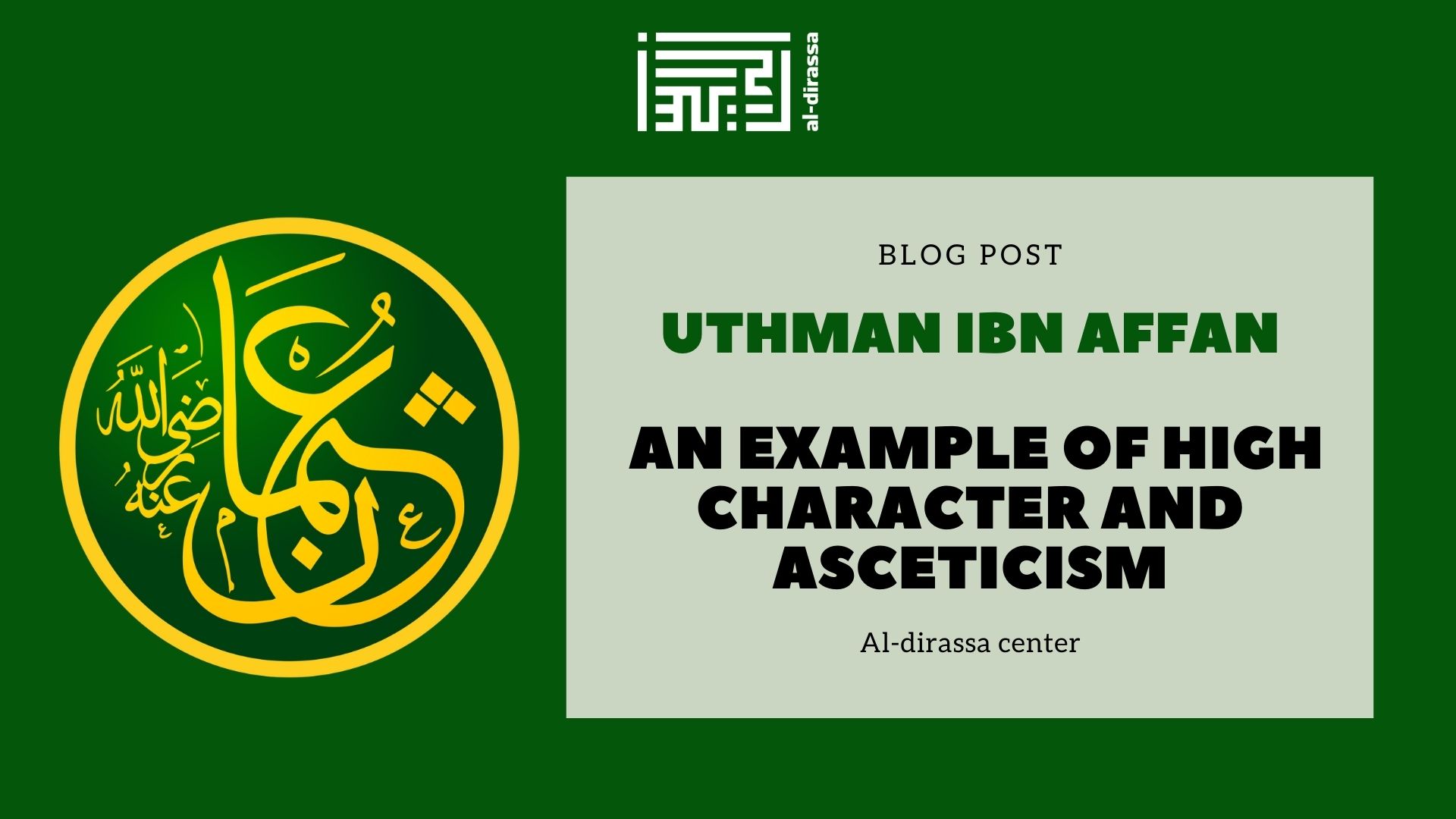
Uthman ibn Affan: an example of High Character and Ascetism
1. Uthman ibn Affan nickname
‘Uthman ibn Affan was one of the earliest individuals to embrace Islam, accepting it shortly after the first revelation to the Prophet ﷺ. He ascended to the position of Caliph following the tragic martyrdom of ‘Umar ibn al-Khattab. Consequently, he is recognized today as the third of the four Righteous Caliphs.
‘Uthman enjoyed significant renown and affection among the entire Quraysh clan, even prior to his acceptance of Islam [1]. He earned the moniker Dhul-Nurain, meaning the “Owner of Two Lights,” owing to his unique distinction as the only person to have married two of the Prophet’s daughters, Ruqaya and Umm-Kulthum. Despite the premature passing of both these esteemed women, the Prophet ﷺ expressed to ‘Uthman that if he had another daughter, he would have gladly wed her to him [2].
2. Characteristics of 'Uthman ibn Affan: A Glimpse into His Remarkable Life
He commanded immense respect from the Prophet ﷺ, primarily owing to his exceptional quality of shyness. An anecdote illustrates this deeply ingrained trait of ‘Uthman. Once, the Prophet ﷺ was reclining in Aisha’s house, his thigh exposed. Abu Bakr visited first, followed by ‘Umar, and finally ‘Uthman. Upon ‘Uthman’s arrival, the Prophet ﷺ promptly sat up and adjusted his clothing. Witnessing this gesture, Aisha inquired why he had done so exclusively for ‘Uthman and not for Abu Bakr or ‘Umar. In response, the Prophet ﷺ remarked, “Should I not show modesty to one whom even the Angels show modesty” [3].
Additionally, Allah’s Messenger ﷺ has acknowledged that “The most merciful of my Ummah towards my Ummah is Abu Bakr; the one who adheres most sternly to the religion of Allah is ‘Umar; the most sincere of them in shyness and modesty is ‘Uthman” [4]. These narrations underscore ‘Uthman’s exceptional character quality, setting him apart from his contemporaries and earning him a unique place in the heart of the Prophet ﷺ.
In this article, we will delve into his distinctive character, his elevated status, and his unwavering commitment to sacrificing for the sake of Islam. These qualities, often lacking in today’s Muslim community, make the study of ‘Uthman’s life profoundly relevant to all of us.

3. Uthman ibn Affan's Exceptional Modesty: A Unique Characteristic
As previously mentioned, ‘Uthman ibn Affan’s predominant character trait was his extraordinary shyness. However, it is essential to recognize that his shyness was truly exceptional, given that he was no ordinary man. He was a highly successful businessman who had amassed considerable wealth. Moreover, he enjoyed widespread fame and adoration among the people of his era, to the extent that Quraysh women would sing lullabies to their children, expressing their love for ‘Uthman by saying, “I love you as much as Quraysh love ‘Uthman” [5].
It’s worth noting that shyness comes more easily when one is an anonymous and unremarkable individual. Many people find it intimidating to interact with others due to this very reason. However, ‘Uthman’s case was entirely different. He was a superstar, a millionaire superstar, to be precise. It’s difficult to fathom someone today holding a status comparable to ‘Uthman’s and still maintaining a sense of shyness when engaging with journalists or other high-profile individuals.
This underscores a critical lesson: the kind of shyness that is inherently respectable and elevates our character applies universally, regardless of the circumstances. Whether we are conversing with someone in a much higher societal position or with someone at the lowest rung of society, genuine shyness is a quality highly valued in Islam. It reminds us of the importance of humility and modesty in all our interactions.
4. Uthman's Serene Disposition: A Reflection on His Easygoing Nature
Another remarkable character trait of Caliph ‘Uthman was his remarkable easygoing nature when dealing with others. Much like shyness, this attribute is often rare in today’s interactions. However, the Prophet ﷺ is known to have conveyed the message that “Allah admitted to Paradise, a man who was easygoing in buying and selling, both when paying off his debts and when asking people to pay him when they owed him” [6].
This sentiment echoes the demeanor of ‘Uthman, who demonstrated such a disposition on numerous occasions. One striking instance is when he allowed the cancellation of a business deal for an individual who had become dissatisfied after the agreement had already been established.
In contemporary business dealings, we tend to be stringent and unforgiving when it comes to contracts. If a client wishes to amend or withdraw from an agreement, it often results in rejection or legal battles if any stipulations have been violated. However, Islam teaches us to be more approachable and lenient in such cases. Consequently, if someone enters into a contract and subsequently finds it burdensome or unfavorable, we are encouraged to facilitate their exit from the agreement. ‘Uthman serves as a shining example of this easygoing approach, reminding us of the importance of compassion and flexibility in our interactions.
5. Uthman's Humility and Gentle Nature: A Profound Character Study
It is narrated that ‘Uthman ibn Affan, during his night prayers, would personally prepare his wudu (ablution) water. When someone observed him doing this task, they inquired why he didn’t instruct his servant to do it for him. ‘Uthman responded with a profound humility, saying, “No, the night is for them to rest” [7]. Despite occupying such a high social standing and enjoying ideal financial circumstances that would have granted him the privilege of assigning household chores to his servants, ‘Uthman displayed remarkable humility by valuing every minute of their rest and tending to even the simplest tasks, such as water preparation, himself.
Moreover, this narration underscores ‘Uthman ibn Affan’s exceptional gentleness. His considerate demeanor extended to his treatment of servants, as he refrained from disturbing their sleep when they could have assisted him. Throughout his biography, ‘Uthman is recognized as a true gentleman, consistently demonstrating compassion toward people, caring for the less fortunate, and ensuring that those in positions of strength fulfilled their responsibilities [8]. His life serves as an enduring example of humility and kindness, emphasizing the importance of looking out for the well-being of others.
6. Uthman's Willingness to Sacrifice and Ascetic Lifestyle

In its conventional sense, religious asceticism typically implies abstaining from various worldly indulgences, such as luxury, marriage, or even social engagement. However, within the Islamic context, asceticism, known as “zuhd” in Arabic, takes on a distinctly different meaning. It is often defined as a state in which attachment to the material world remains in one’s hands but not within their heart.
In this context, a person may possess substantial wealth, enjoy a vibrant social life, and indulge in luxuries, yet still be considered ascetic as long as their heart remains unburdened by an attachment to these worldly possessions. If everything they have were to vanish overnight, it would not sadden them, and if it were to return, it would not increase their happiness. Absolute asceticism, therefore, revolves around the detachment of the heart, rather than the limbs, from entanglement in worldly affairs.
The exemplary embodiment of such detachment can be found in the life of ‘Uthman. As previously mentioned, he was not only exceptionally wealthy but also widely known, beloved, and highly respected in his community before embracing Islam. For a man of his stature to willingly forsake everything was indeed a formidable task. However, when the persecution of Muslims in Mecca reached intolerable levels, and life became unbearable for many believers, ‘Uthman was among the first to undertake the migration to Abyssinia, where Muslims could practice their faith freely.
In this migration, ‘Uthman had to leave behind his thriving business, substantial wealth, and his esteemed social status. His asceticism was evident in the freedom of his heart from the love of material possessions and status, making it relatively easy for him to relinquish his life’s achievements for the sake of Allah.
Throughout his life, ‘Uthman continually demonstrated his asceticism by generously spending substantial portions of his wealth for the betterment of Islam and the well-being of fellow Muslims. He purchased a well in Madinah, ensuring that people could access it for free [9]. He also acquired land and contributed it for the expansion of the Prophet’s Mosque when it became insufficient for the growing Muslim community. Furthermore, he dedicated significant resources to support Muslims preparing for the Tabook campaign [10].
Today, many people find themselves deeply attached to the material world. Our measures of success are often closely tied to our worldly progress. When this progress stagnates or all our achievements are lost, some may experience depression or even contemplate suicide. Hearing a story of someone losing all their worldly possessions is often perceived as the ultimate life challenge. However, if we were to adopt an ascetic mindset, similar to the companions of the Prophet ﷺ, such losses would be met with equanimity, even if we were to initiate them ourselves. ‘Uthman’s life story serves as a powerful testament to the strength of asceticism in transcending the allure of materialism and embodying a profound spiritual detachment from worldly pursuits.
Conclusion
Undoubtedly, ‘Uthman ibn Affan, known as Dhul-Nurain and the third Caliph of Islam, was a man of extraordinary character, earning him a distinguished place among the companions of the Prophet ﷺ and a prominent role in history.
Remarkably, his enduring legacy is not solely attributed to his special social status as a wealthy businessman but rather to how he conducted himself in these roles. His remarkable shyness, despite his fame and status as a “superstar,” his humility, easygoing nature in business transactions, and his gentle treatment of people, including his servants, are the reasons why we reflect upon his life in this article.
In contrast, many individuals today aspire to “write themselves into history” through the pursuit of fame, wealth, and honor. However, they often overlook that it is not the attainment of these achievements that truly matter, but rather one’s virtue in managing them. In ‘Uthman’s example, we witness how he maintained his humility when others might have succumbed to pride and boastfulness. He possessed everything, yet he willingly gave everything for the sake of Allah and his love for the Messenger ﷺ.
These are the character traits that elevated him to greatness, and these are the qualities we should aspire to cultivate in ourselves—virtues that Allah loves.
The Al-dirassa Institute offers online Arabic, Quran, and Islamic courses for non-Arabic speakers. If you are interested in joining our courses, please don’t hesitate to contact us.
References:
[1] Ali M. Sallaabee, The Biography Of ‘Uthman Ibn Affan (Darussalam, 2006), p. 18.
[2] ابن كثير، البداية والنهاية، (دار عالم الكتب: 1424ه/2003م)، ج10، ص347.
[3] Sahih Muslim 2401.
[4] Sunan Ibn Majah 154.
[5] Ali M. Sallaabee, The Biography Of ‘Uthman Ibn Affan (Darussalam, 2006), p. 18.
[6] Musnad Ahmad 410.
[7] Ali M. Sallaabee, The Biography Of ‘Uthman Ibn Affan (Darussalam, 2006), p. 149.
[8] Ibid, p. 147.
[9] Ibid, p. 58.
[10] Ibid, p. 59.
Chosen and Trusted by Thousands of Satisfied Learners
Discover the experiences of our delighted clients who have thoroughly enjoyed utilizing this standout feature.
Alhamdulillah I‘m very pleased with the arabic and Qur’an lessons I receive from teacher Umm Tasneem and I‘m also content with the al-dirassa administration team who were very quick in answering any questions I had. In a month I progressed a lot and I cannot wait to continue my studies with al-dirassa. May Allah reward everyone at al-dirassa.
 Verified review - view original
Verified review - view original
My Qur’an teacher is fantastic, she teaches me in a loving and kind way where I look forward to the lessons and learn so much. My Arabic teacher is equally as nice and has a lot of patience with me, she has great expertise in the field and I’ve progressed really quickly with her. Thank you Al-dirassa!
 Verified review - view original
Verified review - view original
Book your free trial lesson
Don’t want to go through the translation anymore?
30 free minutes with your qualified Egyptian teacher.




